The pandemic has turned the lives and livelihoods of many musicians and actors upside down. Yet, it is their craft which we rely upon to entertain us, rejuvenate us and offer for us a brief escape into one’s imagination. In this new series, we're featuring several Bruin artists and sharing their stories of adversity, adaptation and accomplishment during the COVID-19 era.
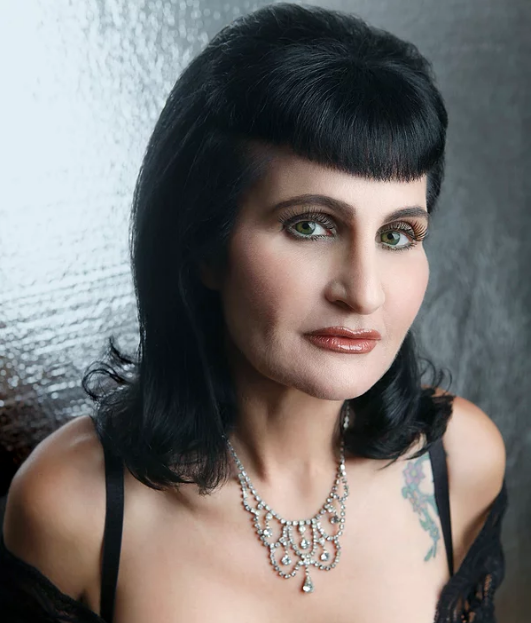
Lawrence Lebo
Award-winning blues musician and songwriter Lawrence Lebo ’05 has been devastated by COVID-19. She earns her income based around live performances and teaching private one-on-one vocal lessons and classes. Now, she is finding ways to reinvent her business, looking for other ways to drive all her marketing and trying to get her fans to support her. “I’m old school!” says Lebo. “Normally, my band and I go into a studio and record live. The pandemic has made this just too risky, and left me with no budget to spend on production and promotion.”
Lebo has done her best to turn her living room into a professional film stage and is doing her best to adapt her art to fit the opportunities available. Her fans are used to a high level of professionalism, so purchasing lighting and some sound proofing is important to the integrity of her work. “There is a big learning curve with everything I am trying to do right now,” says Lebo. “I’ve had to invest in certain equipment in order to continue doing online shows. I am basically learning to be a film producer.”
As she continues to steal the spotlight virtually, Lebo is also a certified fitness trainer and music teacher. Teaching instruments online, such as beginning piano and the ukulele, has been adaptable for Lebo, but not so much teaching vocals online. “I find that private vocal lessons have not worked online for me,” says Lebo. “You can’t accompany your students and there is a huge delay that happens online sometimes. Sure, you can find tons of ‘how to sing’ YouTube videos, but they aren’t for someone who wants to do this weekly.”
As soon as stay at home orders were lifted, Lebo and her husband, the band’s bass player, were able to get together and socially distance with their guitarist, performing on Facebook Live. In the meantime, Lebo continues to write her feature column for the UK e-magazine “Blues in The South.” She has taught a lecture-style class at McCabe’s Guitar Shop for blues and rock vocals, and is currently learning how to present and market this class online.

Alex Ritchie
After a decade of momentum and hustling in the business, the pandemic struck and Alex Ritchie ’15 was in a place trying to understand what was happening. She was just named one of the “Future Power Players in Music” in the Grammys’ short digital series “:NEXT,” recently performed at the Grammy museum and had sung on a Ziggy Marley record. “After all this time having to move in the industry as a marginalized woman, I was on my way to changing mine and my family’s lives,” says Ritchie. “All of that is now on hold.”
The most difficult part for Ritchie has been dealing with budgets being slashed due to cancellations. However, it’s created positive challenges to come up with creative ways to roll out new records. “Being resourceful and finding new marketing ideas for releases has really kept me on my toes,” says Ritchie. “It has reminded me of my love for the business side of things.”
During 2011 and 2012, Ritchie and her family went through some hardships. Her parents lost their home and health insurance, and she fell into debt due to unforeseen circumstances from a previous work partner. Not only was that experience a life lesson, but going through that type of trauma and loss made her more capable of getting through tough times. “Resourcefulness, patience and faith have been major themes for me during this time,” says Ritchie. “So many people who work in music took a major hit, and I’m thankful to have made it through these last few months healthy and able to survive.”
Ritchie is looking forward to spending time with the people she loves, including her music family. More importantly, she is looking forward to going on tour and creating more freely with her favorite collaborators. “Writing and producing for film has come back to the forefront for me,” says Ritchie. “I’m excited for those possibilities. I want to tell great stories and bring them to life.”
In 2017, Ritchie became the youngest committee member for the Recording Academy's L.A. Chapter. She has a new single coming out soon, a new EP set for 2021 and a music video in pre-production. She will be a featured American artist on a new United Nations global campaign to raise money for mental health organizations.
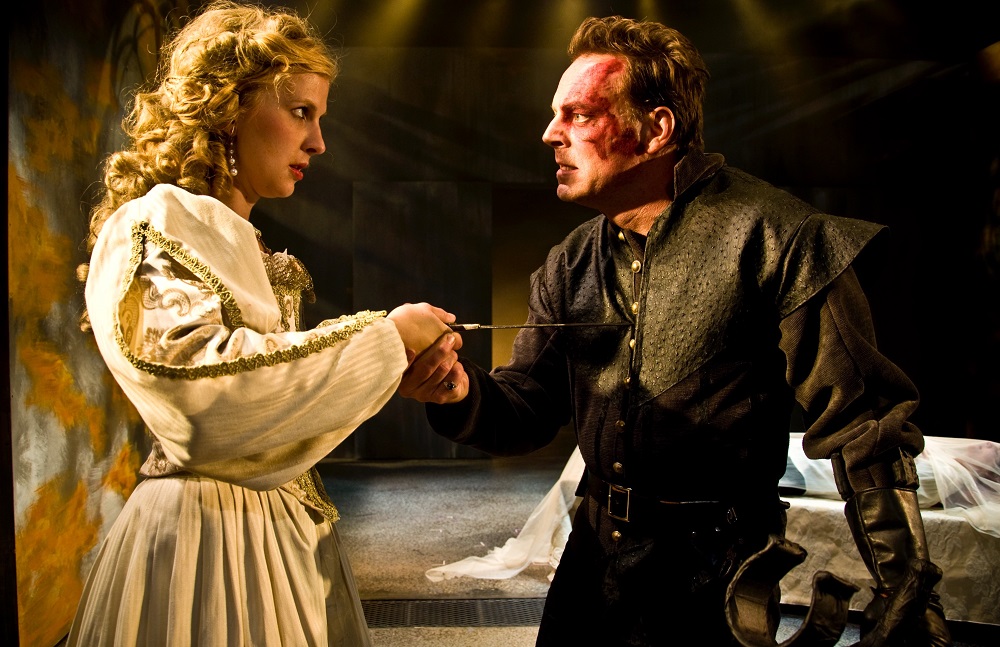
Bo Foxworth
Not very many actors can say the pandemic has been a good thing. Bo Foxworth ’87 has been working nonstop for about eight years, and finally felt relieved when he was able to be at home to pursue some artistic endeavors that had been put on hold. “I’ve stayed incredibly busy doing numerous Zoom readings of new plays, and some classics,” says Foxworth. “I just finished recording a podcast called ‘The Zip Code Plays,’ with the Antaeus Company, of some new radio plays.”
While working and spending more time at home has been great, Foxworth has had to learn and cope with the new normal. He tries to stay creative by writing, painting and creating wood sculptures. “It’s been great to craft your own audition,” says Foxworth. “You can keep taping your audition until you feel you’ve really nailed it. There is less pressure doing an audition from home versus in front of directors and producers.”
Foxworth was in the middle of performing in “Measure for Measure” at the Antaeus Company, and was also the lead carpenter at The Kirk Douglas Theater, but both jobs disappeared when the pandemic hit. A journeyman actor, Foxworth has always believed in working at something, and knowing when the next big acting job was going to come along. “You always find a way to make it work, a way to get by and a way to be creative,” says Foxworth. “[My career] has steeled me into living under strenuous circumstances, especially during the pandemic. When you get to be my age, it’s hard to distinguish what experience came from where. It all becomes life experience in the end.”
One thing that will continue for Foxworth post-pandemic is cherishing more time with family and friends. He is a carpenter and has built guitars with his brother’s company, Asher Guitars, for six years. He is also a fight choreographer for a lot of major theaters in town, including Geffen Playhouse and The Pasadena Playhouse, and will begin teaching a stage combat class to high school students virtually. He is a proud graduate of The Yale School of Drama and was a competitive fencer for the UCLA Fencing team.
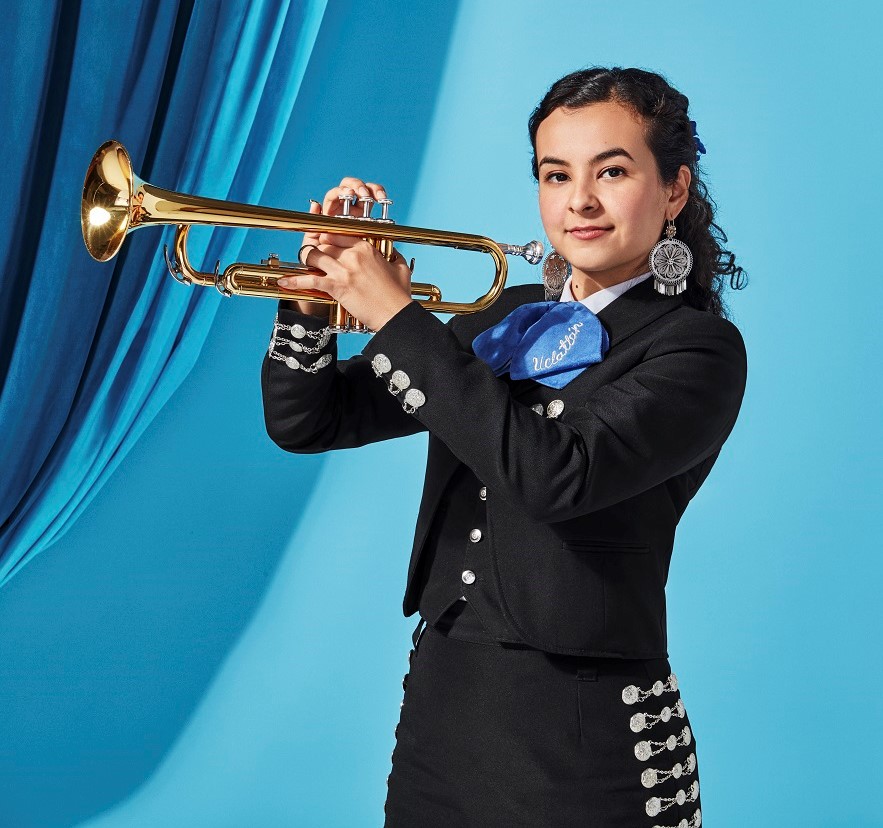
Gabby Gaxiola
During her four years at UCLA, Gabby Gaxiola ’19 took her musical talents on stage performing as a trumpet player for Mariachi de Uclatlán, a student group dedicated to the performance of traditional Mexican music.
An Honors Fellow graduate, Gaxiola was thrilled to apply her UCLA education to the classroom, and begin her teaching career at Animo Watts College Preparatory Academy. “During my first year of teaching, I began a mariachi club for students,” says Gaxiola. “I felt the need to share music with them since our school is small and doesn't have a music program.”
When the shift to remote learning revealed several new challenges for many students, parents and educators back in March, Gaxiola was quick to adapt to Zoom and apply her creativity to build off new lesson plans for her students. Although teaching a class online is not the same, Gaxiola is trying to find that divide between work and home. “Like many teachers, I am in a state of fatigue and constant tiredness,” says Gaxiola. “I miss teaching in front of a class and seeing my students.”
She is taking advantage of digital educational resources to teach online, and contacting music instructors to help her master trumpet playing on Zoom. She is part of a mariachi group and wants to begin recording each group member playing their instrument to upload on YouTube and engage their audience. “It was really sad when we couldn’t gig or practice on the weekends,” says Gaxiola. “We spent so many hours practicing and preparing for the annual Battle of the Mariachis in San Juan Capistrano, Calif. It would have been my eighth time participating.”
Gaxiola and her mariachi group have come up with creative solutions to practice safe social distancing outdoors. They recently started meeting up at a park once a week, playing song covers and sharing their at-home experience. “I miss that feeling of excitement prior to getting on stage when you are performing,” says Gaxiola. “Mariachi is an avenue to express ourselves, and having everything be virtual isn't the same.”
In the next month, Gaxiola is planning to take the mariachi club she started with her students online. Having everyone play together will require hard work, but she is hopeful this will bring a new dimension to classroom relationship-building.
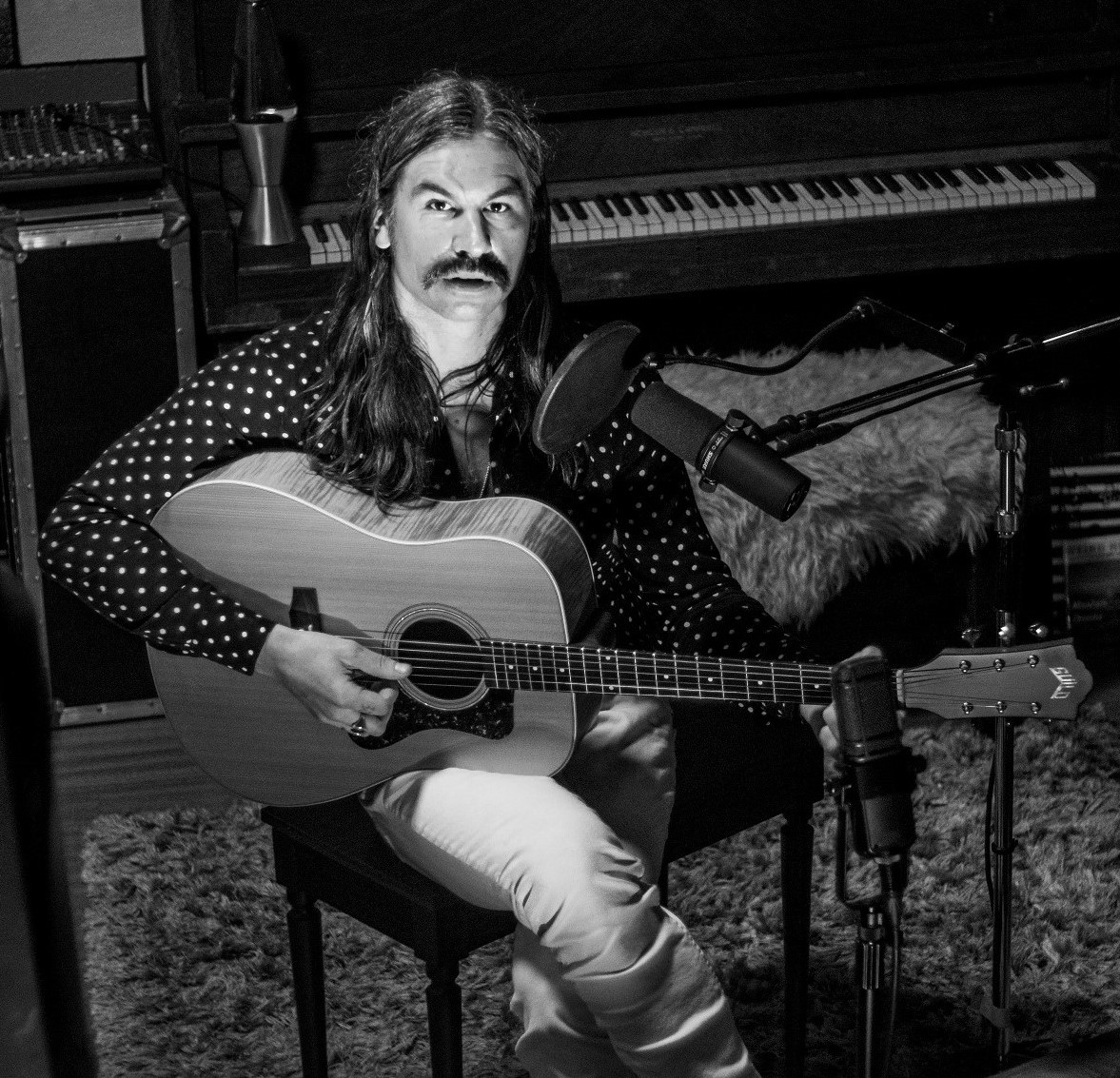
Zache Davis
When Zache Davis ’15 learned the world was heading towards a pandemic, he was at the highest productive output level he’d ever reached in his musical career. When May came around, Davis got burned out and began to be hard on himself, which led him to ultimately stop writing music. “Nothing new was happening,” says Davis. “Everything felt the same, forced and I was completely uninspired.”
Learning to record on his own and figuring out what works with gear, microphone placement and mixing has also been a challenge. It’s much easier for Davis to focus on the music and trust an engineer to ensure everything will sound right when it’s recorded. “I’ve had to learn to not be bothered by my novice recording skills and low-end gear, and instead learn how to semi-comfortably be both the artist and the engineer,” says Davis. “That said, I'm back in the real studio next month with Mark Rains at Station House Studio and I cannot wait to focus solely on the songs and my performance.”
Spending time alone has put every detail of Davis’ life, including his apartment, under a microscope. He’s changed his weekly routine a dozen of times since March, and has spent a lot more time with lyrics through editing and rewrites. “Overanalyzing every day is exhausting and makes every day feel like a week and every week feel like a month,” says Davis. “I think I've grown and learned more about myself in the last six months than I have in the last three years.”
Musically, Davis finds inspiration from friends who are creative and keep creating. He is motivated by friends who have high productivity and a great work ethic. “My writing partner really helped me pull out of my writing slump,” says Davis. “We meet weekly to write and practice and at the beginning he was showing up with two to four new songs every week. Seeing his output plus being in a partnership where I'm expected to contribute every week really helped me.”
Davis is currently working on a project that started a few months ago with writing partner, Patrick Butterworth. They are scheduled to record their first LP this month. Davis is also working on his first solo record, for which he began studio sessions the weekend before the shelter-in-place order.
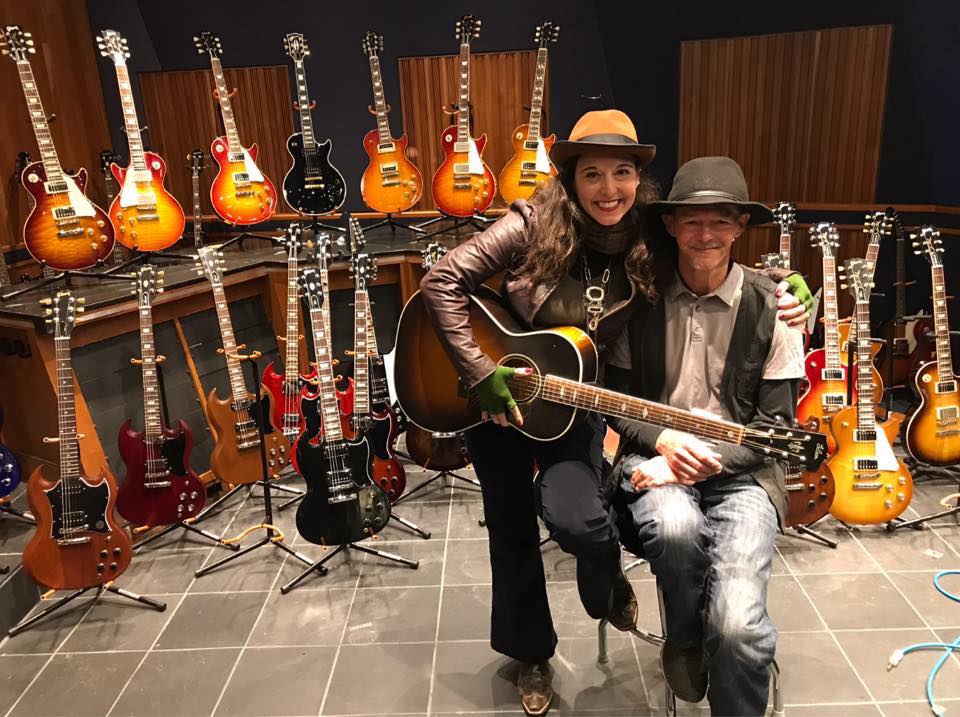
Jenni Alpert
Singer-songwriter Jenni Alpert, also referred to by her birth name, “Cami,” is creating music from home, changing lives and performing online during a pandemic with her birth father, Don. Four years ago, Alpert reunited with Don, who was homeless, running away from the law and suffering from drug addiction. Since their reunion, Don’s amazing transformation and their love of music has truly bonded them, making their quarantine a calm one. “Our lives haven’t changed too much since the pandemic,” says Alpert. “Perhaps because the greater challenges we’ve both faced personally have already come to pass.”
The duo are currently working on a couple of virtual performance programs. They are also sharing their reunion story, and discussing topics surrounding homelessness, incarceration, foster care, adoption, reunification and transformation. “It’s been really special to maintain connection and communication with communities,” says Alpert. “After they express a sense of connection during our online performances, Don exudes a sense of pride in providing music and connection to others. The realization of his impact and his conviction to continue performing and speaking with me is really inspiring.”
If there is anything Alpert and Don are looking forward to post-pandemic, it is traveling around the U.S. to explore new places and to perform in front of a live audience again. “I believe my time spent at UCLA shaped and developed my skills to be able to go out into the world with the focus to make a difference with purpose,” says Alpert. “My maternal birth family introduced me to awareness, understanding and patience, which I had yet to discover. Reuniting with my birth father, Don, many years after graduating was the perfect platform to implement all I had been exposed to and learned from, which created a very full circle of profound positivity for my life now.” In 2018, Alpert and Don appeared in a short documentary film called “Homeless: The Soundtrack,” which highlights their reunion story and explores the dichotomy of two different worlds.
Alpert was the first jazz vocalist admitted to Kenny Burrell’s Jazz Program for the UCLA Department of Ethnomusicology. While at UCLA, she participated in various music ensembles, brought jazz music exposure to elementary schools in Compton, Calif., and was one of the first individuals selected into the UCLA ArtsBridge Program during its first year.
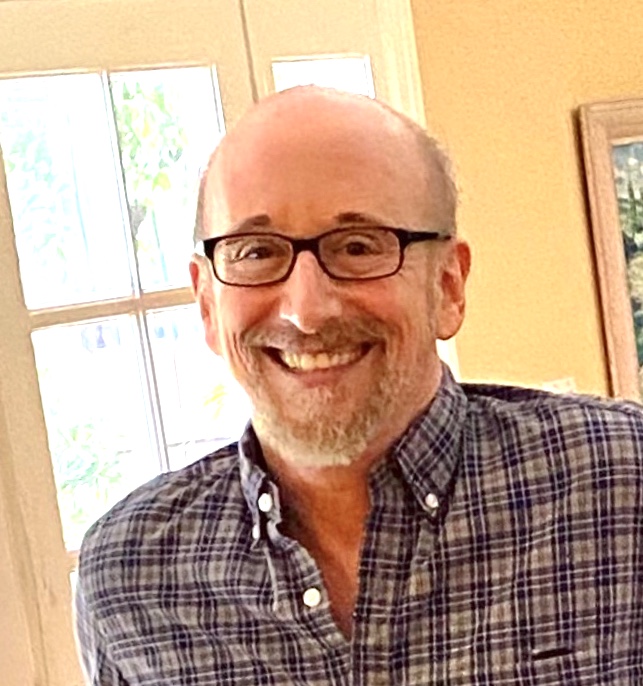
John Starr
For over 30 years, John Starr ’79 has celebrated Halloween, Father’s Day and various other holidays at his home with family and friends. He has been a regular attendee at the Ralph Freud Playhouse at UCLA, and has seen theater performances from all over the world in foreign languages. Now, Starr is finding ways to stay focused doing what he loves from home. “Something I believe in strongly is that you should always be learning,” says Starr. “I’ve been taking online acting classes on Zoom for six months, twice a week, where one class is dedicated to discussing our goals.”
Eventually, this led Starr to create “Porch Playhouse,” a weekly one-minute YouTube video series telling stories and documenting footage from his doorbell camera that was installed two years ago. Whenever his friends would come over, he would text them a video recording of them arriving and leaving his house. “A year from now when we talk about the pandemic, I will know I was able to do something creative as an actor, producer and writer,” says Starr. “Everyone whom I love and care about watches me every week for a minute. It’s costing me money, but it’s worth it.”
One of Starr’s biggest life lessons was meeting with Muhammad Ali, backstage 40 years ago. They were attending an event in Hollywood, and Starr looked for the perfect opportunity to meet with him personally and ask for advice. “Ali told me personally, ‘don’t count the days, make the days count,’ and it’s something that I think about every day since we’ve been in quarantine,” says Starr. “The only thing we can control is our attitude. If you keep talking negativity, you cannot swim away from it.”
Since launching “Porch Playhouse,” Starr has made an effort to donate to various charities, with the help of his colleagues who are helping him produce content. Starr is famously known as “Terry the Clown,” who has made multiple appearances on the Liv & Maddie TV show, the 2013 “Got Milk” Super Bowl commercial and BuzzFeed.
During his time at UCLA, Starr worked at the Geffen Playhouse as an usher, was on “The Dating Game” (1979) TV show, and introduced McDonald’s hash browns during a commercial back in 1976.
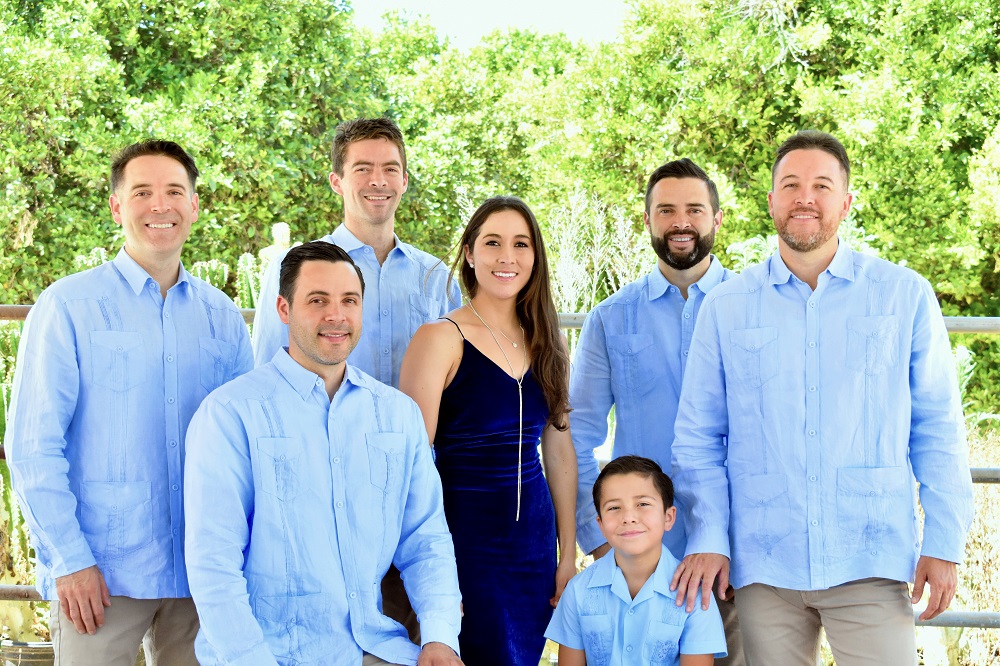
Hermanos Herrera
The bond between siblings is unbreakable, especially when all six siblings from a small agricultural community graduate from UCLA. Hermanos Herrera were born into a family surrounded by love and music. Their father performed traditional folk music from Mexico with his siblings, and has since passed that legacy on to his children. “Growing up, we had a firm understanding of our family background and really wore that like a badge of pride,” says Luis Albino Herrera ’05, M.A. ’07, the second oldest of the six. “We continue to take pride in our cultural background, and carry the lessons learned at a young age every day.”
The pandemic has given Hermanos Herrera a chance to catch up on creating music. They have written close to 40 songs, and most of their songs have been pitched to other artists and released commercially. Their new album release, “Ayer, Hoy y Para Siempre,” features the Mexican folk genre called son jarocho from Veracruz and includes instruments like the harp, requinto and jarana.
This will be their first time submitting an album for a Grammy consideration. “Our songwriting skills are much sharper, and now is the perfect time to release music,” says Herrera. “Many of us are stuck at home looking for an escape, and music can offer that. When life gets back to normal, songwriting will definitely be a part of our weekly schedule.”
Some of their favorite things have been taken away from them during the pandemic, such as eating out as a family, traveling and riding together in a car heading off to gigs. Even though they aren’t able to perform live at the moment, Hermanos Herrera have made extreme musical and career progress during their time at home thanks to their parents’ wisdom and life lessons. “Everything that we do, we do in hopes of making our parents proud,” says Herrera. “Now that we all have children, we want to leave a lasting legacy for our children, and teach them the same valuable lessons our parents taught us.”
During their time at UCLA, all six siblings were part of the student group, Mariachi de Uclatlán. The two eldest siblings, Jorge and Luis, were part of the UCLA Marching Band and their uncle, Andres Herrera ’69, was a Rose Bowl champion in 1966.
Next month, we will feature a new set of artists. Send us an email at connectfeedback@alumni.ucla.edu to recommend a Bruin performer for future articles.